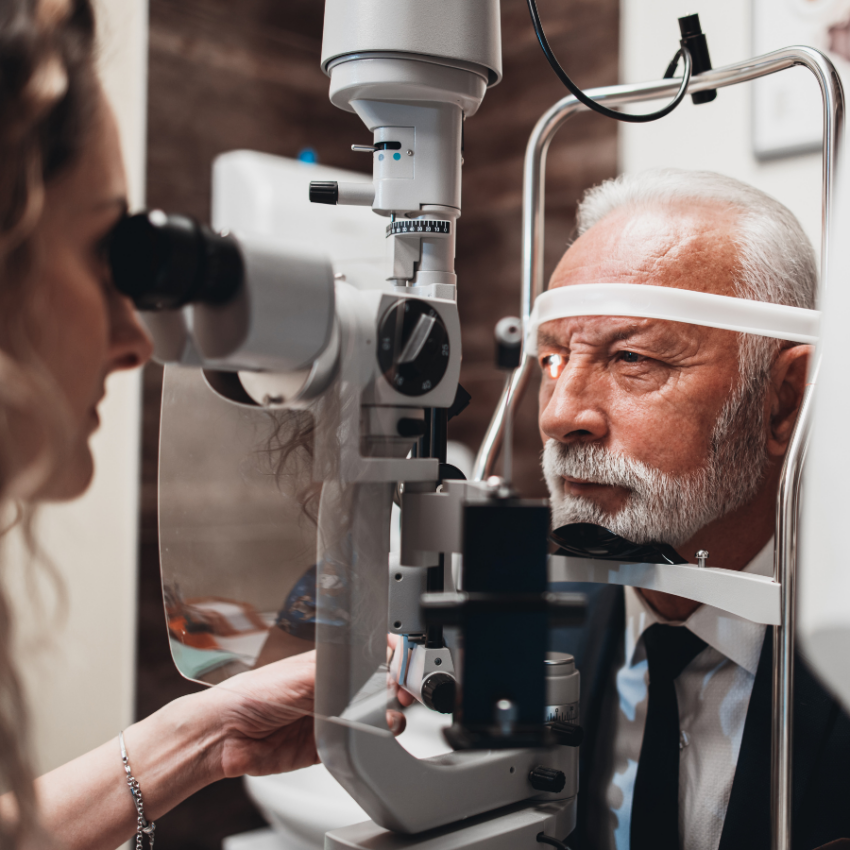Our team of ophthalmology specialists at St Thomas’ Hospital is internationally renowned for delivering exceptional eye care. We offer both routine and complex procedures, treating all types of eye conditions, including cataracts, glaucoma, and diseases of the retina, cornea, eyelids, and orbit.
A history of pioneering eye care
In 1949, the ophthalmologist Sir Harold Ridley implanted the world’s first artificial intraocular lens at St Thomas’ to treat a cataract. This marked the beginning of modern-day cataract surgery.
Our eye specialists continue to advance the field of ophthalmology by researching innovative treatment approaches, including a new device designed to prevent blindness in glaucoma patients. We are also a leading ophthalmology training centre, educating medical students from around the world.

Expertise in every eye condition
We diagnose and treat the full range of eye conditions, including:
- cataracts (all stages of the disease, including early, immature, mature and hypermature cataracts)
- dislocated lens
- external eye diseases, including of the cornea, sclera and anterior segment
- eye movement disorders, including squint
- eyelid conditions, such as eyelid cancers, ectropion (where the eyelid turns outwards), entropion (where the eyelid turns inwards), eyelid cysts and ptsosis (droopy eyelids)
- glaucoma
- inflammatory eye diseases, including uveitis
- neuro-ophthalmic diseases, including optic nerve problems and vision loss
- vitreoretinal diseases, including age-related macular degeneration, diabetic retinopathy, epiretinal membrane, floaters, macular holes and trauma
Specialist eye treatments
We offer both routine and complex eye treatments, including surgical and non-surgical procedures such as:
- blepharoplasty (cosmetic surgery)
- cataract surgery
- corneal grafts
- dacryocystorhinostomy for blocked tear ducts
- entropion and ectropion repair
- glaucoma surgery
- injections for diabetic retinopathy
- injections for macular degeneration
- lesion excision
- ptosis surgery (to tighten the upper eyelid muscle)
- reconstructive surgery following cancer removal
- specialist ophthalmic lasers to treat different eye conditions
- surgery for watery eyes (tightening the eyelid)
- vitrectomy for retinal detachment
Our consultants have a long history of leading the development of new surgical techniques. This ensures patients receive the latest and most precise evidence-based treatments for their eyes.
Personalised cataract surgery
Our hospital is a leading centre for cataract surgery, handling a high number of cases in the region. As a result, our consultants have extensive experience in this treatment.
Private patients have the added benefit of choosing to upgrade their choice of artificial lens from a standard clear lens which focuses at a single distance. Alternatives include multifocal and toric astigmatism correcting lenses that provide good vision at all distances and eliminate the need for reading glasses. In addition, patients can benefit from lower complication rates that come with private cataract surgery.
Trabeculectomy to treat glaucoma
Glaucoma is a chronic eye disease where pressure builds up within the eye, gradually causing damage to the optic nerve. This can lead to blindness if left untreated. A trabeculectomy is a common surgical procedure to treat glaucoma, where a new drainage pathway is created for fluid within the eye to reduce pressure.
Our ophthalmic surgeons at St Thomas’ offer trabeculectomy as a day surgery procedure, so that patients can return home sooner to recover. We also offer laser treatment and minimally invasive glaucoma surgical procedures. For less advanced glaucoma, we can provide eye-drops as a non-surgical treatment.
Photodynamic therapy
Our ophthalmology specialists run the largest photodynamic therapy service in the UK for central serous chorioretinopathy (CSCR). The treatment is considered the gold-standard of care for the condition, with 8 in 10 patients noticing an improvement to their vision within 2 months of a single course of treatment.
In addition to CSCR, photodynamic therapy can be used to treat wet age-related macular degeneration (AMD), polypoidal choroidal vasculopathy and certain cases of vascular tumours of the eye.
State-of-the-art diagnostic facilities
We use the latest diagnostic equipment at our dedicated ophthalmic clinics and operating theatres, including:
- biometry machines to determine the correct lens power for patients requiring cataract surgery
- fundus cameras to perform fluorescein and indocyanine green angiography that determine the health of blood vessels in the retina
- optical coherence tomography (OCT) to create 3D images of both the front and the back of the eye, including the retina and optic nerve
- ocular ultrasound to assess structures of the eyes and diagnose a range of eye conditions
- visual field testing to measure how well patients see from the corners of their eyes and help identify blind spots

Treatments
Explore the ophthalmology procedures our specialists perform at St Thomas' Hospital:
-
Cataract surgery
Cataract surgery can be used to treat cloudy areas that obscure vision.
-
Blepharoplasty (eye lift) eyelid surgery
Eyelid surgery (blepharoplasty) includes a range of treatments for eye conditions such as excess skin, droopy eyelids and benign lesion or cysts.
-
Glaucoma surgery (trabeculectomy)
Trabeculectomy is a type of surgery used to treat glaucoma.
-
Retinal detachment surgery (vitrectomy)
Vitrectomy is a surgical procedure used to repair retinal detachment.
Locations
Our ophthalmology specialists provide care at these locations:
Discover our ophthalmology specialists
Meet our team of world-class ophthalmologists. From common procedures to advanced interventions, our specialists are here to provide you with personalised care